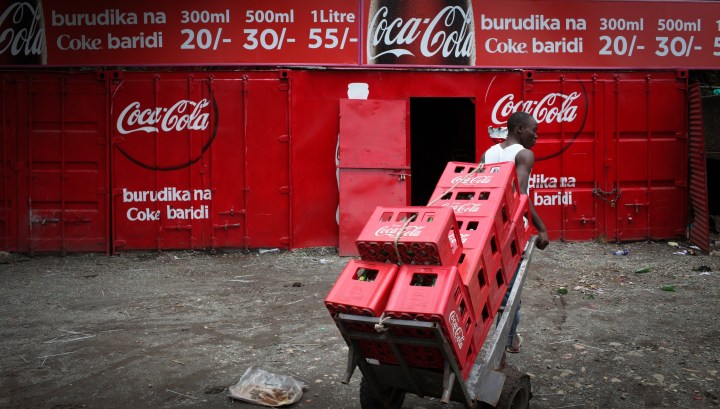LEGAL FIZZ
Coca-Cola Beverages SA wins Concourt appeal against Competition Commission over retrenchments

After complaining to the commission about the impact of the sugar tax on its business in 2018, the bottler was ordered to either come up with a plan to retain jobs, or take the matter to the Tribunal. It chose the latter, which triggered a drawn-out fight over whether the merger caused the job losses, or if the market conditions had done so.
Did the Coca-Cola Company’s merging of four independent bottlers to create Coca-Cola Beverages South Africa cause retrenchments, or were the layoffs motivated by something other than the merger, such as operational reasons?
That’s the question put before the Constitutional Court, in an appeal brought by Coca-Cola Beverages South Africa (CCBSA) against the Competition Appeal Court, which had previously issued a breach notice finding the beverage group had infringed on employment-related merger conditions negotiated with the Minister of Trade, Industry and Competition and the Food and Allied Workers Union (Fawu).
The dispute stems from CCBSA’s merger in 2016, which the Competition Commission approved, subject to conditions including the prohibition of post-merger retrenchments for at least four years.
Market conditions took a turn for the worst, with the introduction of the Health Promotion Levy (sugar tax) on 1 April 2018, causing a sharp increase in input prices, especially sugar.
As conditions worsened, Coca-Cola sales volumes declined sharply, and competition increased. In January 2019, CCBSA notified the commission of these difficulties, indicating the possibility of retrenchments due to operational needs, and informed Fawu and the National Union of Food, Beverage, Wine, Spirits and Allied Workers about potential restructuring under Section 189(3) of the Labour Relations Act.
This triggered a complaint by Fawu to the Competition Commission, which requested information on issues related to the possible retrenchments. Coca-Cola responded by pointing out that it had too many employees; that commercial, regulatory and operational factors gave rise to the need for retrenchments; and that the sugar tax had, in the nine months since its introduction, cost it about R2.1-billion. The retrenchments were “for reasons unrelated to the merger”, it stressed, denying any breach of the merger conditions.
Read more in Daily Maverick: South African industry falsely blames job losses on sugar tax
The commission wasn’t swayed: on 24 October 2019, it issued a Notice of Apparent Breach, alleging that “the retrenchment … took place during the moratorium period prescribed in clause 9.2 of the merger conditions”.
It also put CCBSA to terms on 29 April 2020 to submit a plan, or approach the Tribunal for relief. Coca-Cola opted for the latter.
The Tribunal ruled in favour of Coca-Cola, finding there was “insufficient evidence to demonstrate that a principal reason for the retrenchments was the removal of duplicate roles” arising from the merger. It also accepted Coca-Cola’s reasons for the retrenchments (i.e. the need to reduce costs to address the impact of the sugar tax, adverse macroeconomic circumstances and rising input prices), declared that Coca-Cola had substantially complied with merger conditions and set aside the notice of apparent breach.
The commission then took the matter before the Competition Appeal Court, which overturned the Tribunal’s decision and ordered Coca-Cola to pay the commission’s costs, which is what brought the matter to the Constitutional Court.
In a ruling issued on 17 April, the apex court found in favour of CCBSA. The court wrote that the Tribunal applied the causation test correctly, in seeking the “true reason” for the retrenchments after finding the requisite link between the merger and the retrenchments wanting. It said the Competition Appeal Court was not only wrong in finding that the Tribunal applied the incorrect test for a causal nexus, but that the court does not have unbridled powers to interfere with a decision by the Tribunal — a specialist adjudicator in the competition field, well-acquainted with the applicable law, economics and policy — particularly in relation to its findings of fact.
The court noted that the Competition Appeal Court’s interpretation has “potentially grave and unjust consequences” for a merged firm.
“The firm may have to provide and implement a plan for remedying the apparent breach or face punitive proceedings for revocation, an administrative penalty or, possibly, divestiture, in circumstances where the commission reasonably but wrongly believed there to have been a breach; or where there was an apparent, but not an actual breach. That would sanction an injustice and a breach of the rule of law. There is no support in the act for holding a firm liable on the basis of an apparent breach.”
The Competition Appeal Court furthermore mischaracterised the nature of the appeal and applied the wrong tests in respect of both review and causation.
“There was no basis in law or fact for overturning the judgment of the Tribunal.”
As such, CBSA’s appeal succeeded although it failed in its attempt for a cost order. DM



















I don’t like any of these fizzy drinks but dislike the Competitions far more….. they are anti business as a rule.